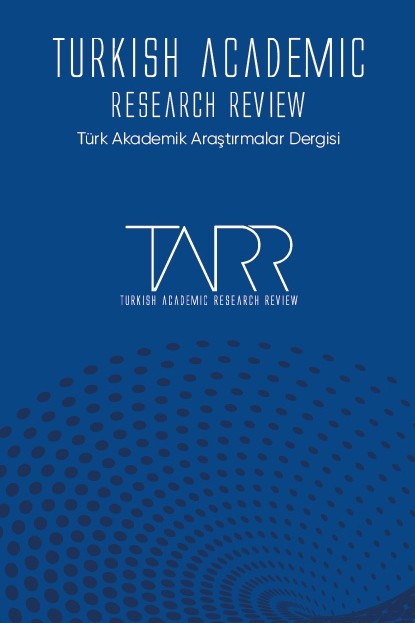Türkiye’deki Çağdaş Sosyoloji Metotları: Metodoloji Tartışmaları ve İkilikler Üzerine Bir Analiz
Metodoloji, Türkiye Sosyolojisi, Nitel Yöntem, Nicel Yöntem
The Contemporary Sociology Methods in Turkey: The Analysis of Methodology Debates and Dualities
Methodology, Turkey Sociology, Qualitative Methods, Quantitative Methods,
___
- Akın, M. H. (2008). Sosyolojide Yöntem Sorunu Olarak Anlama ve Açıklamanın Sınırları. Selçuk University, Faculty of Arts and Sciences, Journal of Social Sciences, 20, 103-114.
- Akpolat, Y. (2016). Türk Sosyolojisi Üzerine Kisa Bir Bakış. Sociology Conferences, 53, 3-27.
- Aksan, G. (2016). Max Weber ve Değerler Sosyolojisi: Bir Metodolojik İkilemin Düşündürdükleri. Selcuk University the Journal of Faculty of Literature, 35, 427-446.
- Alkan, E. Ö. (2015). Sosyolojide Temel Metodolojik İkilikler ve Bunlari Aşma Girişimleri. İnönü University International Journal of Social Sciences, 4(1), 1-24.
- Başak, S. (2005). Türk Sosyolojisinde Yapı Araştırmaları. Bilig, 32, 33-63.
- Bayhan, V. (2016). Sosyal Bilimlerde" Objektiflik" Efsanesi. Mukaddime, 7(2), 217-242.
- Bulut, Y. (2014). Türkiye’de Sosyolojinin 100 Yılı. Istanbul University Journal of Sociology, 3(28): 1-21.
- Çelebi, N. (2008). Sosyoloji Sosyologun Yaptığı İse. Hacettepe University Turkish Studies (HÜTAD), (8), 69-80.
- Çelik, N. (2018). Kamusal Alanda Sosyal Taklit: Sosyal Medyada Yeni Gelin Evi Imgesi, Selçuk University, Institute of Social Sciences, Department of Sociology PhD Thesis, Konya.
- Çetintaş, A. (2015). Sosyolojik Kuramlara Hakim Temel Paradigmalar Çerçevesinde Toplum-Birey Dualizmi. İnönü University International Journal of Social Sciences, 4(1), 25-42.
- Collins, D. (2005). Organisational Change: Sociological Perspectives. Routledge Puplications.
- Della Porta, D., and Keating, M. (Eds.). (2008). Approaches and Methodologies in The Social Sciences: A pluralist perspective. Cambridge University Press.
- Durkheim E. (1982b) The Contribution of Sociology to Psychology and Philosophy (1909). In: Lukes S. (eds) The Rules of Sociological Method : Contemporary Social Theory. Palgrave, London
- Durkheim, E. (1982a). The Method of Sociology (1908). In The Rules of Sociological Method (pp. 245-247). Palgrave, London.
- Erbaş, H. (2015). Türkiye’de Bedeller Ödemiş bir Sosyolojik Düşünce Ustası: Sosyolog Behice Boran. Mülkiye Dergisi, 39(3), 5-58.
- Esgin, A. (2015). Sosyal Bilimci mi, Yoksa Doksalog Teknisyenlermiyiz? Türkiye’deki Bazi Sosyoloji Pratikleri Üzerine Eleştiriler. Sociology Notes, 52 (2015-2) / 191-220.
- Esgin, A., Özben, M. (2018). Klasik Sosyoloji ve Gündelik Hayat: Durkheim’dan Parsons’a, in Gündelik Hayat Sosyolojisi, Ed: Ali Esgin, Güney Çeğin, Phoenix Puplications, 13-35.
- Giddens, A. (2012). Sosyoloji, Kırmızı Publications, 1. Edition, İstanbul.
- Giddens, A. (2013). Sosyolojik Yöntemin Yeni Kuralları, Sentez Publications, 2. Edition, Ankara.
- Gouldner, A. W. (2015). Batı Sosyolojisinin Yaklaşan Krizi. Trans: Mesut Şenol, Sakarya University Culture Publications, Sakarya.
- Johnson, D. P. (2008). Contemporary Sociological Theory: An Integrated Multi-level Approach. Springer Science and Business Media.
- Kasapoğlu, M. A. (1992). Sosyolojide Birlik Sağlama. Ankara University the Journal of Department of Philosophy, 14, 201-218.
- Keirns, N. J., Strayer, E., Griffiths, H., Cody-Rydzewski, S., Scaramuzzo, G., Sadler, T., ... and Jones, F. (2013). Introduction to sociology. OpenStax College, Rice University.
- Mizruchi, M. S. (2017). The Current Crisis of American Sociology, Michigan Sociological Review, 31,1-26.
- Niezen, R. (2015). The Durkheim-Tarde Debate and the Social Study of Aboriginal Youth Suicide. Transcultural psychiatry, 52(1), 96-114.
- Öztürk, E. (2017). Sosyolojide Nesnellik Sorunu Bağlamında Max Weber’in Pozitivizm-Hermeneutik İkiliğini Aşma Girişimi. Ankara University Journal of Social Sciences, 4(1), 196-244.
- Schwemmer, C., and Wieczorek, O. (2020). The Methodological Divide of Sociology: Evidence From Two Decades of Journal Publications. Sociology, 54(1), 3-21.
- Sezer, B., andÇağan, K. (2007). Türk Sosyolojisi ve Baykan Sezer. Journal of Social Sciences, 9 (2), 69-86.
- Simmel, G. (2009). Bireysellik ve Kültür, çev. Tuncay Birkan, İstanbul: Metis Yayınları.
- Tarde, Gabriel (1903). The Laws of Imitations. Elsie Clews Parsons (translator), New York: Henry Holtand Company.
- Uluocak, Ş. (2016). Tözcülük-İlişkisellik Dikotomisi Açisindan İlişkisel Sosyolojik Modellerin Türkiye’de Sosyoloji Pratiği ve Düşünümselliği Açisindan Olasi Açilimlari. Sosyoloji Konferansları, (53), 101-153.
- Vargas, E. V., Latour, B., Karsenti, B., Aït-Touati, F., andSalmon, L. (2008). The Debate Between Tarde and Durkheim. Environment and Planning D: Society and Space, 26(5), 761–777.
- Yıldız, R., and Hira, İ. (2010). Sosyal Bilimlerde Yöntem Tartışmaları Bağlamında Kuhn ve Rothacker. Journal of Academic Studies (AID), 5(2), 133-153.
- Yayın Aralığı: Yılda 4 Sayı
- Başlangıç: 2016
- Yayıncı: Mehmet ŞAHİN
Arapçada “Lahn”ın İlk Dönem Dil Çalışmalarına Etkisi
Ali ALBAYRAK, Ömer Faruk TEBER, Yusuf GÖKALP
Aziz Nesin Düşüncesinde Ateizmin Yansımaları
Türkiye’deki Çağdaş Sosyoloji Metotları: Metodoloji Tartışmaları ve İkilikler Üzerine Bir Analiz
Yusuf GÖKALP, Sabri YILMAZ, Ömer Faruk TEBER
Azerbaycan Türk Felsefî ve İçtimaî Fikir Tarihi XIX – XX Asırlar
Mevlânâ'nın Mesnevî'sinde Köpek Metaforu
Osmanlı Döneminde Tıp Alanında Eser Veren Balkanlı Hekimler
